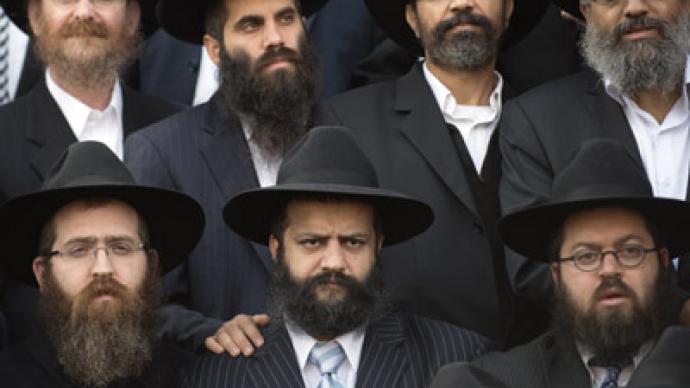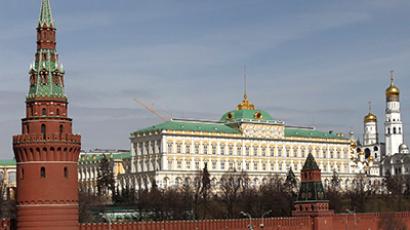Russia, US in Hasid books brawl: Moscow wants recourse over $50,000 daily penalties

Moscow is preparing a lawsuit against the US Library of Congress over rare books claimed by a US-based Hasidic group. The move comes amid ‘outrage’ over a US court ruling to fine Russia US$50,000 daily until it surrenders the texts.
Russia’s Foreign Ministry is planning to fight the Washington court’s ruling, which reads that Russia must pay $50,000 daily until it agrees to hand over the so-called Schneerson Library to US-based Jewish organization Chabad-Lubavitch (Agudas Chasidei Chabad).The Schneerson Library, a collection of thousands of rare religious Hasidic books and documents, was started by Rabbi Joseph I. Schneersohn in the Russian city of Lyubavichi (present-day Belarus) in the early 20th century. Part of it was nationalized by Soviet Russia because there were no legal heirs in the Schneerson family.
Rabbi Yosef Yitzchok (Joseph Isaac) Schneersohn was born in 1880 in Lyubavichi, near Mogilev, in the Russian Empire (modern Belarus). An Orthodox rabbi and spiritual leader of the Chabad-Lubavitch Hasidic movement. After becoming the movement’s sixth Rebbe in 1920, he spent years trying to keep Orthodox Judaism alive in the Soviet Union. He was allowed to leave the Soviet Union in 1928. He died in 1950 in Brooklyn, NYC, USA. The last 10 years of his life were spent in America. Known for a rich collection of Jewish religious books and documents dating back to the 18th century. A large part of the Schneerson Library stayed in the Soviet Union once Rabbi Schneersohn left the country.
Russia’s Foreign Ministry has ‘recommended’ that the Ministry for Culture and the Russian State Library prepare a counter suit against the US Library of Congress, which assisted Chabad-Lubavitch in appropriating some books from the Schneerson Library in 1990s.The Russian State Library’s actions are expected to be symmetrical to the actions of the American side. They are expected to file a lawsuit with a Moscow court. If it finds the Library of Congress guilty of purloining the books and the financial claim is not settled, that will be a basis for Russia to demand the seizure of the non-immune American property abroad.The roots of the conflict go back to 1994, when the Library of Congress obtained seven rare Schneerson Library books from the Russian State Library through an inter-library exchange system.The books were handed on to Chabad-Lubavitch and the US library helped to prolong the use of the books twice, in 1995 and 1996, before in 2000 the Jewish organization practically refused to return the books to Russia. Chabad-Lubavitch used diplomatic channels to propose an ‘exchange’, sending a list of the books they were ready to give back in return for getting the seven abovementioned books into indefinite possession.Russian librarians were taken aback by the ‘proposal’.
“Accepting the proposal would be unjust,” Deputy Director of the Russian State Library Aleksandr Samarin told Kommersant daily, also pointing out that the exchange would be unequal. Besides that, those books printed in the Russian Empire in 19th century, that got ‘lost’ in the US are not subject to the inter-library exchange system and their dispatch to the US Library of Congress was nothing but an act of goodwill.Samarin stressed that the Russian State Library has all the documents that the books were given to the Library of Congress, enough to hold it responsible for the appropriation in court.In 2004 Chabad-Lubavitch filed a lawsuit against Russia, claiming the Russian part of the Schneerson Library in full. In 2010 an American court granted their claim, which Russia ignored as invalid.In January 2013, the US court imposed on Russia a $50,000 daily fine for not complying with its earlier decision.
Chabad-Lubavitch is one of the largest Hasidic movements of Orthodox Judaism in the world. It has cells in over 1,000 cities around the world. Founded in the late 18th century by Rabbi Shneur Zalman, the movement was based in the Russian town of Lyubavichi, near Mogilev, until the early 20th century. In 1940, the sixth leader of the organization Yosef Yitzchok Schneersohn escaped from WWII raging in Europe to New York, USA, where he established a synagogue. The movement’s current official HQ is in the Crown Heights section of Brooklyn, NYC.
Russian Foreign Minister Sergey Lavrov said that the ruling of the American court concerning the Schneerson Library “has nothing in common with justice,” emphasizing that the collection is the “heritage of the Russian nation.”"It is outrageous that a Washington court has taken this unprecedented step fraught with most serious consequences, such as the imposition of a fine on a sovereign state," the Russian Foreign Ministry said in a special statement.The ministry slammed the US ruling as “exterritorial in nature,” and a violation of international law. Russia considers the ruling to be legally null and void, the Foreign Ministry’s statement stated."The Schneerson Library has never belonged to the Chabad [Lubavitch]; it never left Russia,” the statement pointed out, therefore a 'return' of these books to the US is “not an issue in principle.”Though the scandal over the Schneerson Library became particularly loud in early 2013, Russia has been suffering the consequences of the US court decision since 2010. Cultural exchange with the US has been minimized because Chabad Lubavitch promised to seize Russian cultural property exhibited in the US to put pressure on Russia to fulfill the US court’s decision about the Schneerson Library.Press Attache at the US Embassy in Moscow Joseph Kruzich told Kommersant daily that the US State Department does not support this particular sanction imposed on Russia because it goes against the US Foreign Sovereign Immunities Act introduced in 1976. At the same time he confirmed that the US authorities do support Chabad Lubavitch’s claim to get the Schneerson Library into its possession.Russian diplomats believe that the US authorities have been acting “sluggishly” and failed to explain to the court the real state of facts concerning the Schneerson Library.“We will seek to make a reciprocal move. This [situation] should not be left without reaction,” Russian FM Sergey Lavrov proclaimed in January.














